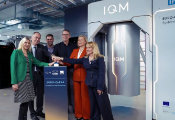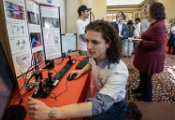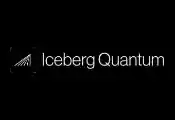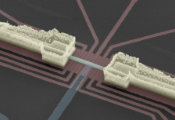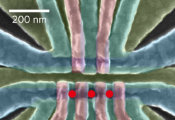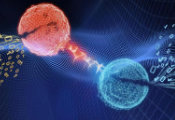Zapata AI Publishes Research Findings From Phase II of DARPA’s Quantum Benchmarking Program
BOSTON, June 20, 2024 -- Zapata Computing Holdings Inc. (“Zapata AI” or the “Company”), the Industrial Generative AI company, today announced that it has published and will present to the Defense Advanced Research Projects Agency (DARPA) select research findings — alongside its collaborators Rigetti Computing, University of Southern California, HRL Laboratories and L3Harris — from its participation in Phase II of DARPA’s Quantum Benchmarking program. Publication of these results represent a critical milestone in DARPA’s initiative to quantitatively measure the economic value of specific, transformational quantum computing use cases and the associated hardware-specific resources required for a given level of performance. As the only company participating across all program tracks, the results serve as a testament to Zapata AI’s continued leadership in quantum computing.
“We are very excited to present our research into how quantum computers can generate substantial economic benefits across industries and speed up the process in which complex industrial scale problems can be solved,” stated Peter Johnson, Lead Research Scientist and Co-Founder for Zapata AI. “Our participation in the transformative Quantum Benchmarking program reflects the quality DARPA sees in our platform and research capabilities, and we are very appreciative it has trusted Zapata AI to co-lead these efforts alongside our partners. Working with influential government agencies like DARPA on projects like this one involves a rigorous selection process and a commitment to pushing beyond the realm of what’s possible, and it’s an absolute honor to be at the forefront in shaping how quantum computing can potentially be used to redefine the future as we know it."
In collaboration with its partners, Zapata AI has been focused on 1) developing use cases for quantum computing and estimating their utility1, and 2) developing software tools to predict the capabilities of and to develop future quantum computers2. During Phase II of the program, the Company and its partners at L3Harris and the University of Toronto estimated the economic utility of several high-value applications, representing millions or billions in potential value, and the quantum resources required to unlock that value. Applications include:
- Homogenous catalyst design. The research represents the new state-of-the-art resource estimation for nitrogen fixation in ammonia production, widely used in agricultural fertilizer.
- Incompressible computational fluid dynamics for applications such as simulation-driven ship design. The paper represents the first ever resource estimation for this particular use case.
- Correlated material simulation for applications such as superconductor and battery design.
DARPA kicked off its Quantum Benchmarking program in 2021 with a goal of reinventing the metrics that are critical to measuring quantum computing progress and applying scientific rigor to often unsubstantiated claims about quantum computing’s future promise. Zapata AI was selected by DARPA for participation in Phase 1 of this program in 2022, with the Phase I award focused on building BenchQ, an open-source tool for benchmarking quantum computing applications, and demonstrating its value for resource estimation. In 2023, the Company was selected for Phase II of the program, which is focused on improving the tool to increase community adoption.
Throughout the remainder of Phase II, which is expected to conclude in March 2025, Zapata AI and its partners will continue to optimize the quantum algorithms studied for the various applications and improve the utility estimates to understand the value proposition of future quantum computers.



